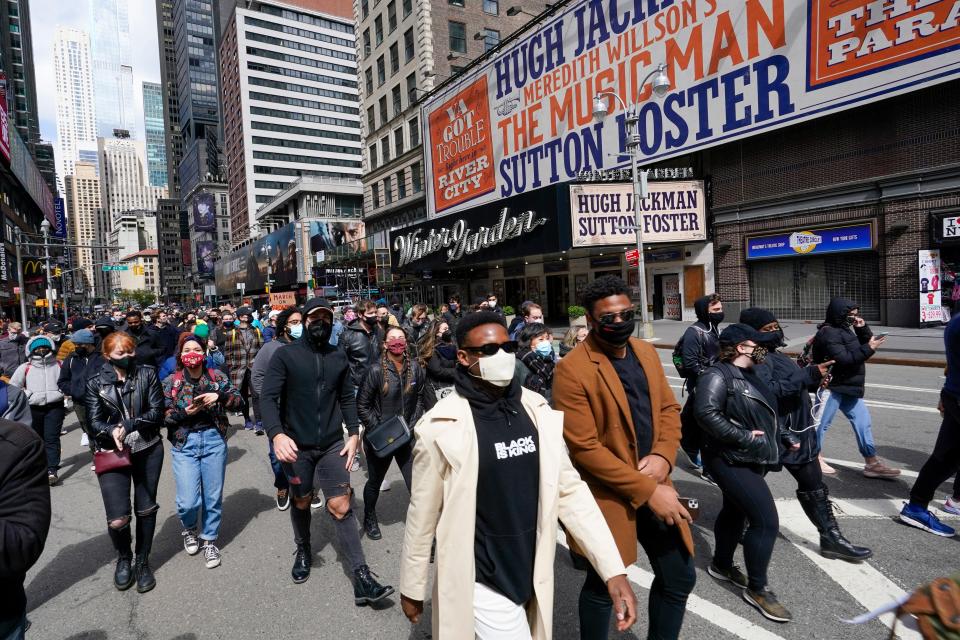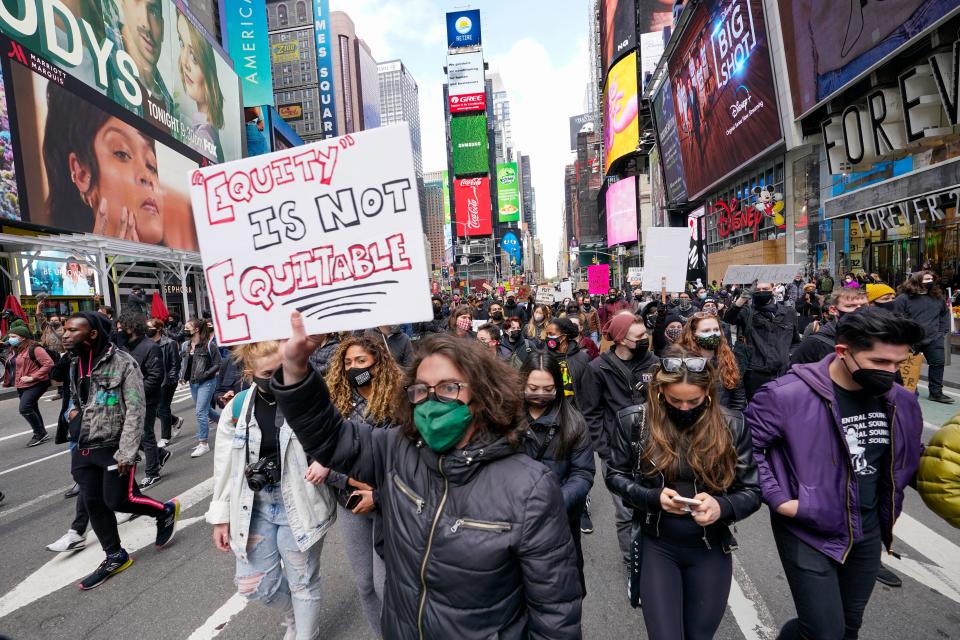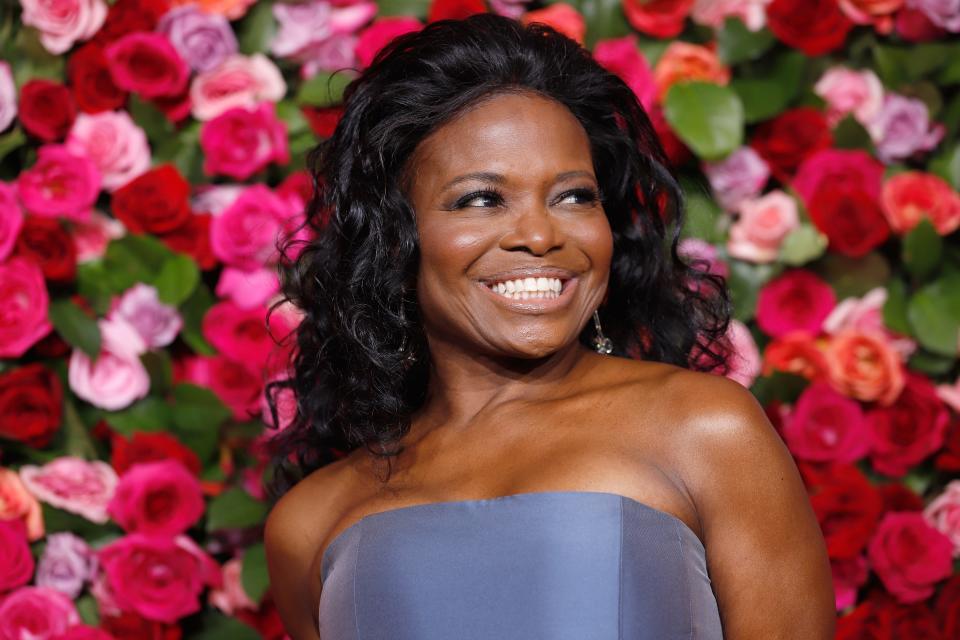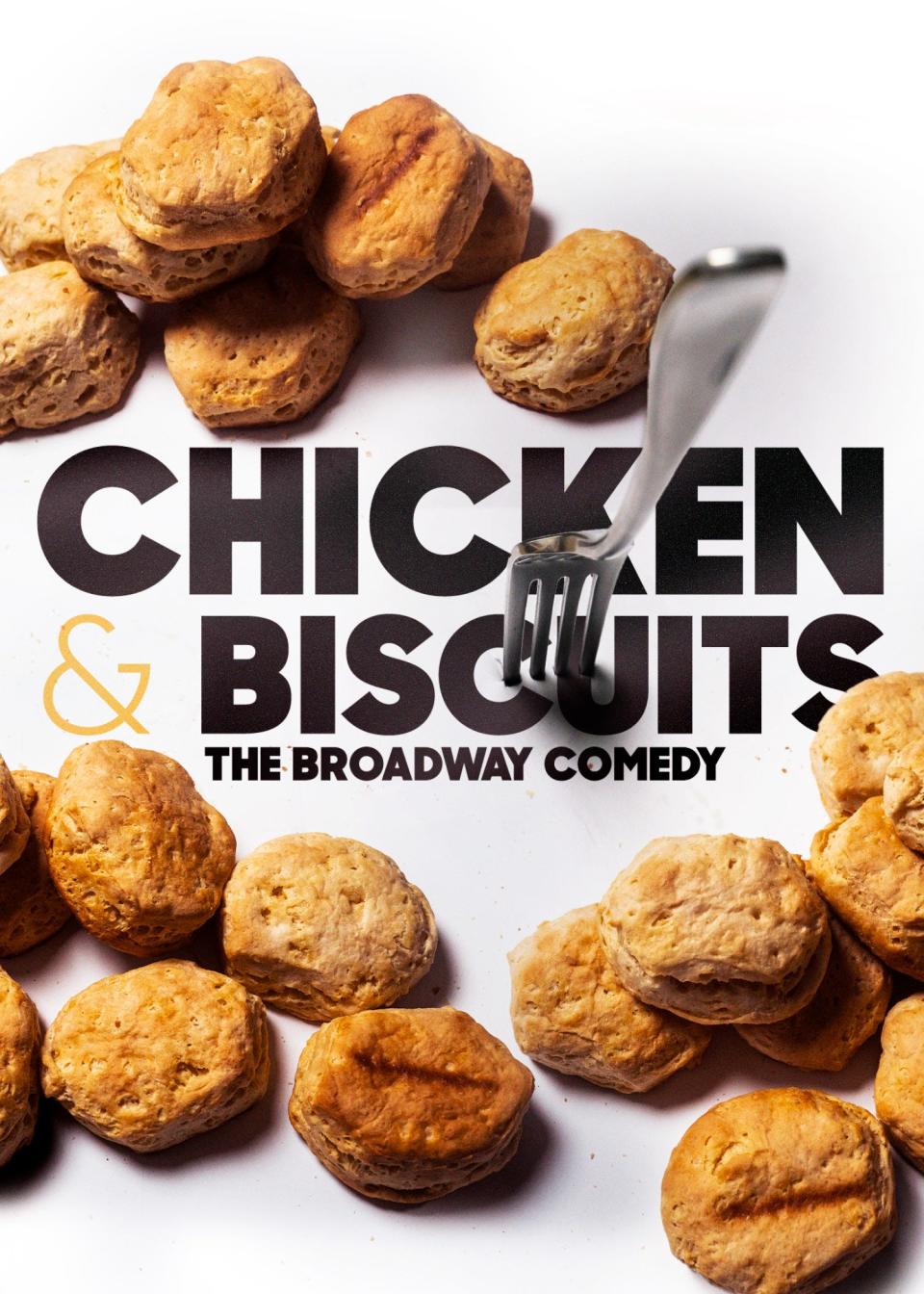As Broadway reopens, activists worry that diversity 'still feels like an afterthought'
Corrections & Clarifications: A previous version of this report incorrectly described the parting of costume designer William Ivey Long and the musical “Diana.” Long and producers say the parting was mutual.
Everyone deserves a chance to fly.
As Broadway juggernauts including "Wicked," "Hamilton" and "The Lion King" prepare to reopen Sept. 14 – with nearly three dozen other new and returning shows scheduled to start performances before the end of the year – has enough been done to help rectify the theater community's longstanding issues with racism and inequality?
In late April, actors/activists Courtney Daniels and Nattalyee Randall organized March on Broadway, a protest attended by about 300 people in New York calling for safe and equitable workplaces and more inclusion for people of color, members of the LGBTQ community and artists with disabilities. The march was spurred in part by last summer's Black Lives Matter protests and allegations against Broadway power producer Scott Rudin, who was accused of harassment by multiple former staffers in an explosive story in The Hollywood Reporter that month.
Rudin, a producer of "To Kill a Mockingbird" and "The Book of Mormon," announced he was resigning from the Broadway League a day after the march, and he removed himself from an active role in the productions. But "there's still more work to be done," Daniels says.

"I know that change takes time, but if you care enough, change can happen really soon," she says. "The good thing about March on Broadway is that it gave everybody a spark to stand up for themselves." Many actors and crew members have started to "work with their own companies and figure out what to do to push forward. But I do not feel that change is happening soon enough. I still think there are environments that are not safe for people of color."
Randall, who has appeared in "Rocktopia" on Broadway, says creating change often falls on the backs of actors. Karen Olivo quit "Moulin Rouge! The Musical" in April over the "silence" around Rudin's alleged abuse, demanding "a theater industry that matches my integrity." (The show recently announced it hired a director of equity, diversity and inclusion.)
Andre Jordan, featured in the upcoming Princess Diana musical, helped organize cast and crew members to restage the show so Black actors weren't relegated to the background. They also lobbied to ban costume designer William Ivey Long, who has been accused of sexual harassment, from working on the show, and set up an anonymous tip line for actors. Long says the allegations were false. Long and the producers for "Diana" say their parting was mutual.
But are these grassroots efforts enough? As Broadway prepares to reopen, "I've heard concerns from people privately" about returning to work, Randall says. "There are people who are still concerned with health issues and safety issues and vaccination and racism. It's just never ending, because people are still doing stuff behind closed doors, even though they're acting like, 'Oh, we're trying to switch things around and change,' when secretly, it's like you're walking right back into the same toxic environment."

New Deal makes sweeping steps toward inclusion, safety
The New Deal for Broadway, a collaboration between theater industry leaders pledging widespread reform, hopes to assuage those worries. The 17-page document details short- and long-term commitments by unions, producers, theater owners, casting directors and creators to help ensure equity, inclusion, diversity and accessibility starting in the 2021-22 Broadway season.
The pact was hammered out during an industry summit organized by Black Theatre United, an advocacy group of actors, musicians, writers and other creatives who came together in the wake of George Floyd's murder last summer in police custody in Minneapolis. The agreement stipulates that going forward, directors and authors will not assemble all-white creative teams. Diversity riders will be included in all new contracts, to help ensure that members of underrepresented communities will be represented across cast, creative, production, and management positions. Producers will also provide mandatory annual training on equity, diversity, inclusion, accessibility and belonging.
"We just want everyone to be more sensitive of situations that could potentially be harmful against Black people in a theater," says Tony-winning actress LaChanze, a founding member of Black Theatre United, who returns to Broadway this fall in "Trouble in Mind."
"We've dealt with them for years, but now we're hoping, with Broadway coming back, (that) we're able to have structures in place that would prevent that. And it starts with training: knowing what to say and what not to say. How to be sensitive to an artist whose hair may be different from yours, or common vernacular that we've gotten used to and how harmful it can potentially be."

Further out, Shubert, Nederlander and Jujamcyn theaters have committed to renaming at least one of their Broadway venues for a Black artist. (The August Wilson Theatre, now home to "Pass Over," is the first and only Broadway theater named for a Black creative.) But as "beautiful and wonderful" as that change is, it's not a top priority for Michael McElroy, an actor and co-founder (along with Darius de Haas) of Black Theatre United.
"Speaking as an artist and being a Black person, (renaming theaters is) not as important as Black artists going into these rehearsal spaces and knowing there's a support system for them," McElroy says. "Knowing there's been a shift in the community that has put systems in place to not only value their contribution, but make sure we are training and shifting the mindset" and holding people accountable.
"It's nice not to feel alone," de Haas adds. "A lot of people in our organization have had the experience of being the only people, or one of two or three people in the room, of color. It is really extraordinary to lock arms with our community in this very new and hopefully continuous way."

Transgender and disabled artists demand better representation
But some groups still don't feel adequately represented. Trans March on Broadway, a protest against transgender inequality, was scheduled for Labor Day in New York. The rally is in response to recent comments by "The Phantom of the Opera" producer Cameron Mackintosh, who told The Telegraph that putting trans actors in classic shows would be "gimmick casting" and "damage the integrity of the original storylines."
"It’s time to come together as a community and center trans bodies where they have been erased," the march's organizer, who goes by Sis, said in a statement. "My hope is to start the conversation so that we can better navigate gender identity within the entertainment industry."
Christine Bruno, an actor and activist, says the New Deal agreement is "amazing, and I'm really glad to see they included disabled artists in that conversation. But it still feels like a bit of an afterthought to me."
Although it includes a commitment that audition materials include Braille for the visually impaired, there are no other specific plans outlined to promote more representation for artists with disabilities, or make theaters more accessible for disabled actors and patrons. (After a lawsuit by the U.S. Attorney's Office of the Southern District of New York alleged multiple violations of the Americans with Disabilities Act, Jujamcyn Theaters agreed this summer to add more wheelchair-accessible seating for audience members.)
According to a 2018 study by the Centers for Disease Control and Prevention, 1 in 4 people have some type of disability. So "we're looking for more authentic representation of what we see out on the streets," Bruno says. "And not the same old trope-y shows like 'Of Mice and Men,' but new and innovative work." Regardless of whether you're telling a story about disability, "make sure you have disabled artists in the mix."
On the other hand, there's no lack of plays and musicals starring and created by Black artists coming to Broadway this summer and fall, including "Chicken & Biscuits," "Thoughts of a Colored Man" and "Caroline, or Change." But Randall finds herself frustrated that so many new shows center on Black trauma.

Watching "Pass Over," which opened last month and addresses police brutality, "was the most triggering (experience). They said (the N-word), like, 400 times," Randall says. "After 18 months, this is what we brought back to Broadway: a show that is for white people, it's not for Black people."
In a show like “The Music Man," which is being revived in December with Hugh Jackman and Sutton Foster, "why can't Harold Hill be Black? Why can't Marian be deaf? Why can't we have a trans artist as any of the characters? Include diversity in your shows, and that fixes" some of the problems.
And as Broadway looks to lure theatergoers back in an uncertain time, Randall worries for the future of Black-led productions if these fail. (The Broadway League is not reporting weekly attendance and ticket sales for the 2021-22 season.)
"My God, I hope we're not the 'downfall': why things aren't selling, why things aren't working," Randall says. "I am encouraged that people want to see Black art and they're trying to put it to the forefront. I just don't want it to mess up and then they blame us."
This article originally appeared on USA TODAY: Broadway is back after 18 months. But is it any safer for minorities?

 Yahoo Movies
Yahoo Movies 